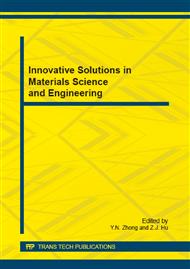[1]
Qinghua Zhu, Joseph Sarkis, Kee-hung Lai. Institutional-based antecedents and performance outcomes of internal and external green supply chain management practices, Journal of Purchasing and Supply Management , 19(2013) 106–117.
DOI: 10.1016/j.pursup.2012.12.001
Google Scholar
[2]
He Yutao, Green Scientific and Technological Achievements of Lenovo Think CentreM Series Improve Business Development, Communications World Weekly, 2009-9-15.
Google Scholar
[3]
Ruoshui. The Former Microsoft Executive Exposure R & D experienced Fails of HP Slate Tablet[EB/OL]. Phoenix Technology Channel, 2012-6-25.
Google Scholar
[4]
Wang Neng Min, SUN Lin-yan, YANG Tong. Obstacles of Green Manufacturing Strategy [J]. China Mechanical Engineering, , 16 (2005) 693-696.
Google Scholar
[5]
Zhu Q H, Sarkis J. The moderating effects of institutional pressures on emergent green supply chain practices and performanc. International Journal of Production Research, 45(2007) 4333-4355.
DOI: 10.1080/00207540701440345
Google Scholar
[6]
Zhu Q H, Sarkis J, Geng Y. Green supply chain management in China: Pressures, practices and performance. International Journal of Operations and Production Management, 25(2005)449-468.
DOI: 10.1108/01443570510593148
Google Scholar
[7]
SikharBarari, GauravAgarwal W.J. (Chris)Zhang, Biswajit Mahanty M.K. Tiwari. A decision frame work for the analysis of green supply chain contracts: An evolutionary game approach. Expert Systems with Applications , 39(2012): 2965-2976.
DOI: 10.1016/j.eswa.2011.08.158
Google Scholar
[8]
Debabrata Ghosh, Janat Shah. A comparative analysis of greening policies across supply chain structures. Int.J. Production Economics, 135(2012): 568–583.
DOI: 10.1016/j.ijpe.2011.05.027
Google Scholar
[9]
Govindan K, Kaliyan M, Kannan D. Barriers analysis for green supply chain management implementation in Indian industries using analytic hierarchy process. International Journal of Production Economics, 147(2014) 555-568.
DOI: 10.1016/j.ijpe.2013.08.018
Google Scholar
[10]
Dou Y, Zhu Q, Sarkis J. Evaluating green supplier development programs with a grey-Analyti- -cal network process-based methodology. European Journal of Operational Research, 233 (2013)420-431.
DOI: 10.1016/j.ejor.2013.03.004
Google Scholar
[11]
Sarkis J, Gonzalez-Torre P, Adenso-Diaz B. Stakeholder pressure and the adoption of environmental practices: The mediating effect of training. Journal of Operations Management, 28(2010): 163-176.
DOI: 10.1016/j.jom.2009.10.001
Google Scholar
[12]
Aspremont C, Jacquemin A. Cooperative and noncooperative R&D in duopoly with spillovers. American Economic Review, 78(1988): 1133 -1137.
Google Scholar
[13]
Ye Fei, Lin Qiang. Revenue Sharing Mechanism of Risk-averse Supply Chain . Management Engineering, 26 (2012) : 113-118.
Google Scholar


